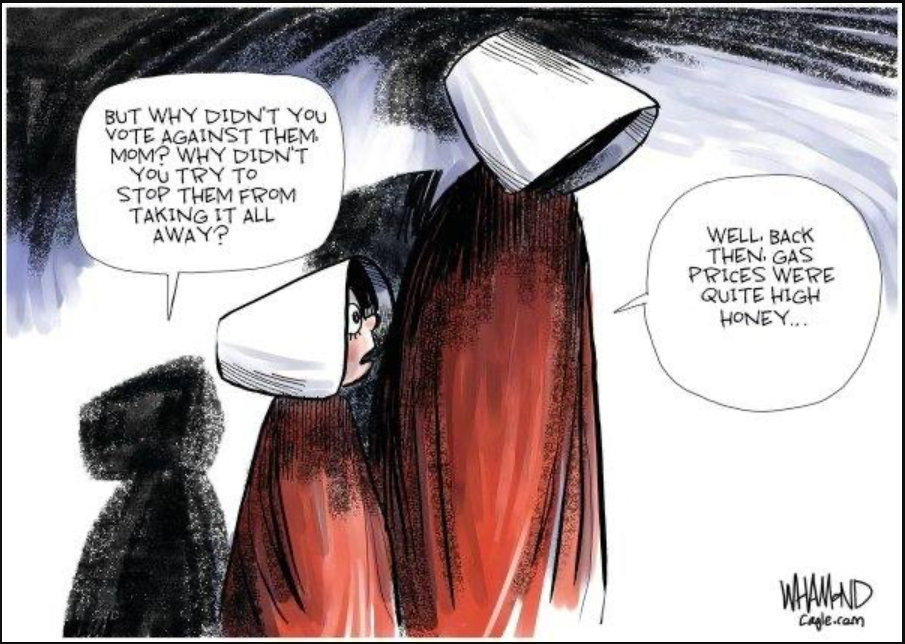The Daily Escape:

Sunset, Thumpertown Beach, Cape Cod, MA – October 2022 iPhone photo by Wrongo
We’re back from a truly delightful time with family and friends on Cape Cod. The next few days will be hectic because we’re leaving again on Sunday, this time for a week in London.
About the November midterms. It seems clear that the polls are tightening in many races. Some of that is natural and to be expected as the political horse races head down the stretch. Some pundits like Amy Walter, think that this demonstrates that the Dems have reached the ceiling for their support in 2022:
“So, basically, what…I’m hearing from…sources in the campaigns is that Democrats may have maxed out that enthusiasm gap they got over the issue of abortion and that growing beyond that is going to be the challenge.”
Robert Hubbell agrees that recent polls have swung towards the GOP, but questions whether these polls reflect the facts on the ground:
“Never before in American history have we faced the elimination of an existing Constitutional right for 51% of the population. Never before have we faced a party whose platform seeks to end the very democracy they seek to rule…”
More from Hubbell:
“Do polling models account for those unprecedented conditions? I don’t know. Do polling models account for the fact that increases in registration among women are driven by outrage over the ruling Dobbs? I don’t know….Polls are not destiny.”
Polling isn’t an exact science. Much depends on how you frame the questions, and who gets asked the questions. One distinction is whether the poll asks the questions of “registered voters” or “likely voters.” Not all registered voters are likely to vote, but all likely voters are registered voters. In some polls Republicans are doing better among likely voters than they are among registered voters, meaning that in those polls, Republicans may be assumed to be more “enthusiastic” than Dems about getting to the polls.
Pundits think that voters’ view of the economy will decide how they vote. Since the 1990s, both Parties have been locked in a battle over which Party voters trust to handle the economy. Democrats have tended to win elections when they had a clear lead on this question, such as during the 2008 financial crisis or in the 1992 election. Otherwise, they’ve either lost, or the elections were very close.
From The Economist: (emphasis by Wrongo)
“According to a new Gallup poll released on October 3rd, 51% of adults now trust Republicans more with the economy, compared with 41% for the Democrats. Though Republicans held the advantage on Gallup’s question for much of the past decade, the gap between the parties’ ratings is now the widest since 1991.”
Sounds terrible for Dems, no? More from The Economist:
“…such a gap should doom the Democrats in this November’s midterm elections. If the average voter trusts Republicans to make them more prosperous, surely they would not deliver Congress back to the hands of the Democrats? After all, what voter casts a ballot against their own personal prosperity?”
But according to a survey carried out for The Economist by YouGov, there are plenty of voters who prioritize other issues. Each week, YouGov asks 1,500 Americans to pick their most important issue from a list of problems. Over a third currently say that either the state of the economy or inflation are their top concerns, followed by roughly 10% each who say it’s health care, climate change or abortion.
Fewer mention civil rights (7%), national security (6%), or crime, immigration, and government spending (5% each). Less than five out of every 100 Americans say it’s either education, or gun control.
The poll shows that while just 4% of adults said that abortion was their primary issue last October, nearly 9% say so today. Among likely voters having abortion as their primary issue, 75% of them say they will vote for Democrats versus just 21% of Republicans.
That’s a much wider gap than the advantage Republicans enjoy on the economy. The Economist notes that if just 20% of likely voters prioritized the economy above all other issues (rather than the 31% who currently say they do), Democrats would be ahead by 7 percentage points and likely keep the majority in both Houses.
Therefore, the outcome of November’s midterms may depend on whether the Democrats can make gains among those voters who mostly care about the economy. We see that the media and many politicians conflate inflation or the Dow Jones stock average with the economy, but maybe they should be covering that Industrial Production in the US is at an all-time high.
Manufacturing is higher than at any previous level with the exception of the end of 2006 through early 2008. And those elusive manufacturing jobs that went to Asia? We’ve added 1.5 million manufacturing jobs since April 2020, reaching a level not seen since December 2008.
But go ahead and vote Republican because of gas prices:

Voting has already begun in a few states, but we really don’t know what’s going to happen in the midterms. It will boil down to turnout. Our destiny is in the hands of those who bother to show up and many people don’t believe that their vote even matters.
Stop worrying. Instead, do something to help get out the vote. If you don’t have the money, donate your time. If you don’t have the time, donate your money.

One of the factors that limits the success of Democrats is the suspicion and distrust of “liberals” who are seen as representing cities and all their corruption, also sin and crime. Another factor is outright racism. I read the Dispatch – a conservative site but somewhat sane. A commenter who appeared reasonable then said that she does not see either Walker or Warnock as having the character of the qualifications to be in the senate.
Warnock? Character? Sorry – I see racism.